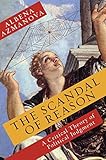The Scandal of Reason : A Critical Theory of Political Judgment / Albena Azmanova.
Material type: TextSeries: New Directions in Critical Theory ; 47Publisher: New York, NY : Columbia University Press, [2012]Copyright date: ©2012Description: 1 online resource (296 p.)Content type:
TextSeries: New Directions in Critical Theory ; 47Publisher: New York, NY : Columbia University Press, [2012]Copyright date: ©2012Description: 1 online resource (296 p.)Content type: - 9780231153805
- 9780231527286
- 320.01 23
- JA71 .A95 2012
- JA71 .A95 2015
- online - DeGruyter
- Issued also in print.
| Item type | Current library | Call number | URL | Status | Notes | Barcode | |
|---|---|---|---|---|---|---|---|
 eBook
eBook
|
Biblioteca "Angelicum" Pont. Univ. S.Tommaso d'Aquino Nuvola online | online - DeGruyter (Browse shelf(Opens below)) | Online access | Not for loan (Accesso limitato) | Accesso per gli utenti autorizzati / Access for authorized users | (dgr)9780231527286 |
Browsing Biblioteca "Angelicum" Pont. Univ. S.Tommaso d'Aquino shelves, Shelving location: Nuvola online Close shelf browser (Hides shelf browser)

|

|

|

|

|

|

|
||
| online - DeGruyter The Philosopher’s Touch : Sartre, Nietzsche, and Barthes at the Piano / | online - DeGruyter Why Jane Austen? / | online - DeGruyter Reforming the International Financial System for Development / | online - DeGruyter The Scandal of Reason : A Critical Theory of Political Judgment / | online - DeGruyter The Awakened Ones : Phenomenology of Visionary Experience / | online - DeGruyter In the Company of Strangers : Family and Narrative in Dickens, Conan Doyle, Joyce, and Proust / | online - DeGruyter The Secret Financial Life of Food : From Commodities Markets to Supermarkets / |
Frontmatter -- Contents -- Preface -- Introduction: The Scandal of Reason and the Paradox of Judgment -- 1. Political Judgment and the Vocation of Critical Theory -- 2. Critical Theory: PoliticalJudgment as Ideologiekritik -- 3. Philosophical Liberalism: Reasonable Judgment -- 4. Philosophical Liberalism and Critical Theory in Dispute -- 5. Judgment Unbound: Arendt -- 6. From Critique of Power to a Critical Theory of Judgment -- 7. The Political Epistemology of Judgment -- 8. The Critical Consensus Model -- 9. Judgment, Criticism, Innovation -- Conclusion: Letting Go of Ideal Theory -- Glossary -- Notes -- References -- Index
restricted access online access with authorization star
http://purl.org/coar/access_right/c_16ec
Theories of justice are haunted by a paradox: the more ambitious the theory of justice, the less applicable and useful the model is to political practice; yet the more politically realistic the theory, the weaker its moral ambition, rendering it unsound and equally useless. Brokering a resolution to this "judgment paradox," Albena Azmanova advances a "critical consensus model" of judgment that serves the normative ideals of a just society without the help of ideal theory. Tracing the evolution of two major traditions in political philosophy-critical theory and philosophical liberalism-and the way they confront the judgment paradox, Azmanova critiques prevailing models of deliberative democracy and their preference for ideal theory over political applicability. Instead, she replaces the reliance on normative models of democracy with an account of the dynamics of reasoned judgment produced in democratic practices of open dialogues. Combining Hannah Arendt's study of judgment with Pierre Bourdieu's social critique of power relations, and incorporating elements of political epistemology from Kant, Wittgenstein, H. L. A. Hart, Max Weber, and American philosophical pragmatism, Azmanova centers her inquiry on the way participants in moral conflicts attribute meaning to their grievances of injustice. She then demonstrates the emancipatory potential of the model of critical deliberative judgment she forges and its capacity to guide policy making. This model's critical force yields from its capacity to disclose the common structural sources of injustice behind conflicting claims to justice. Moving beyond the conflict between universalist and pluralist positions, Azmanova grounds the question of "what is justice?" in the empirical reality of "who suffers?" in order to discern attainable possibilities for a less unjust world.
Issued also in print.
Mode of access: Internet via World Wide Web.
In English.
Description based on online resource; title from PDF title page (publisher's Web site, viewed 02. Mrz 2022)


